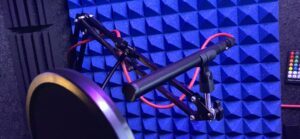Musing at the Mic
– BY SCOTT THOMAS

Your mic. It’s the tool of your trade as a voice over artist. The heart and soul of your vo business. Choosing the right mic for voice over can be tricky, so if you’re in the market for a studio mic – that one piece of equipment that’ll make or break you more than any other – continue doing what you’re doing – reading about mics. Research. And then research some more.
As with most things, price is a good starting point if you’re searching for a good studio microphone. You can spend anywhere from a couple hundred to several thousand dollars when investing in a professional microphone. If you’re just starting out and price matters, I would recommend looking in the $200 – $400 range.
Geeking out with Mic Speak
There are a lot of terms you’re going to come across when searching for a studio microphone: large diaphragms, cardioid patterns, condenser mics, dynamic mics, phantom power, audio converters, XLR, USB, pop screens, booms, stands, shock mounts and spit cups just to name a few. Okay, I may have made that last one up.
Thankfully, you don’t need to know everything about every type of mic, so here are the basics: typically, if you stick with a large diaphragm condenser mic with a cardioid pattern, you’ll be in good shape for studio voice overs. If you want a more comprehensive lesson on mics, take a few minutes and check out this fantastic article from my friends at BeginnerGuitarHQ.
Are USB mics an option?
If you decide to go with a USB mic, you won’t need to buy an audio converter – it’s essentially “plug-n-play”. However, an XLR mic is considered the professional-grade industry standard, so you should take that into consideration. These days, you can purchase a good USB microphone for around two hundred bucks. Now, “good” is a relative term, and keep in mind that USB mics are not meant for every form or level of voice over. However, their quality has really come a long way in the last few years, and the higher-end USB mics are really good starter units for aspiring voice over artists.
A good option to consider is the Blue Yeti Pro which comes with both XLR and USB connectivity. It’s a well-respected, solid choice, and runs below $250 – so a definite possibility to look into.
No substitute for a test drive
Any time you have an opportunity to test a microphone you’ve never used before, take it! The mic that works best for you may still be out there, undiscovered…waiting to be found! Where I live, we have a Guitar Center that will set up microphones for you to test. Call ahead and find a store that offers this service. Ask what mics they have available to put in the lineup, schedule a time and bring your own headphones.
One final tip to remember, is that every voice is different, so you may find that a mic may sound amazing for one person, but may sound only “okay” for someone else. Or worse. For instance, if you’re someone who has a higher than average amount of mouth noise during your reads, some mics may accentuate that even more. Of course, you can always sweeten, and even repair audio in post (iZotope RX audio repair is amazeballs), but the goal is always to have the best, cleanest sound going in.
The ideal microphone for your voice over journey is all about discovering what works for you. Find your sweet spot, balance quality with price and before you know it, you’ll have mastered the art of reading aloud in a padded room.
